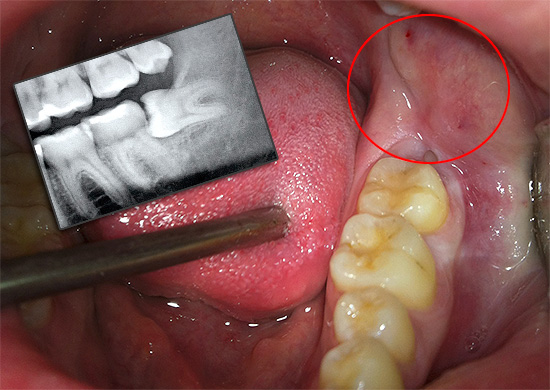
When a wisdom tooth grows and the gum hurts, in most cases a diagnosis is made such as pericoronitis - difficult eruption. It is important to understand that in such cases it is not the wisdom tooth itself that hurts, but the soft tissues surrounding it, pain in which is a response to irritation from the growing tooth and often the seventh “neighbor” next to it.
Such constant irritation of the gums leads to its inflammation, which is characterized by the following five signs:
- pain;
- edema;
- local temperature increase;
- hyperemia (redness);
- some dysfunctions.
The pain and the accompanying gum swelling around the growing wisdom tooth is a clear signal that you need to urgently make an appointment with the dentist. You should not expect that the tooth will erupt soon and the problem will resolve itself.
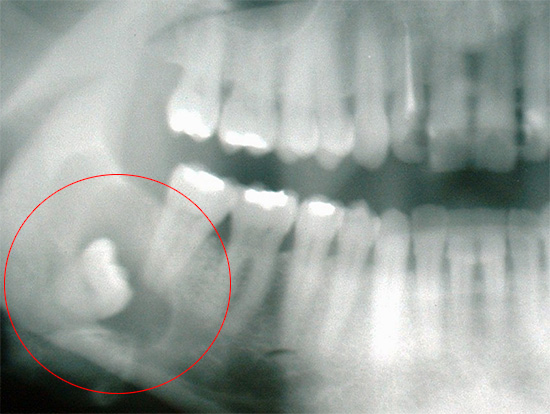
There are people who, instead of going to the dentist-surgeon for help, simply jam the pain with painkillers (Ketorol, Analgin, Tempalgin, etc.), but this is an unreasonable approach, since any inflammatory process in the region of the eighth lower teeth (wisdom) extremely dangerous. The danger lies in the fact that the spread of pus, and with it a bacterial infection, into the deep cellular spaces of the jaw in such cases occurs extremely quickly.
First of all, people with a reduced immune system or weak body reactivity to an infectious focus are affected. In the deep cellular spaces there is abundant blood supply, so the infection from them penetrates further, moving into the interfascial areas of the neck, up to the mediastinum. Against the background of a violation of immunity, the activity of pathogenic bacteria can ultimately cause sepsis (blood poisoning) and death.
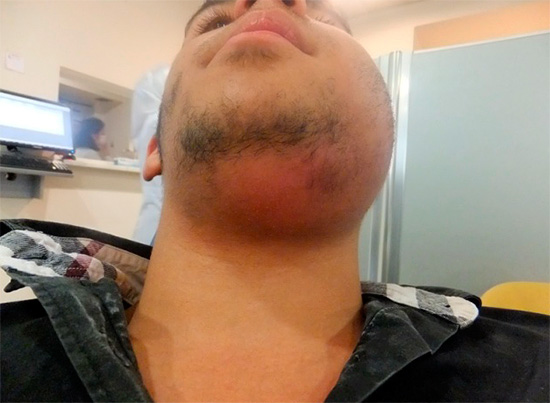
On a note
In the program “Let them talk” on July 18, 2011 with the scandalous topic “Tooth I give” there were three stories related to the tragedies and dramas at the dental appointment. The most terrible story was related to the death of a girl from Kirov - from a wisdom tooth.
A young and healthy girl on the eve of the wedding got a wisdom tooth. After suffering pain throughout the night, she went to the nearest local clinic, where the surgeon understood the essence of the problem as difficult teething, and made an incision in the gums to “remove” the obstructing “hood” in this way and help the tooth crawl out. At the same time, the doctor did not prescribe any drugs, and he spent emergency care on the weekend, sending the girl for further examinations at the place of residence. There was no improvement from the treatment: the temperature rose, swelling of the gums near the wisdom tooth increased, the pain intensified, so the girl turned to a private clinic for help.
There she was washed the wound left by the last doctor after the operation of excision of the hood, but again no prescription was prescribed. A day later, the girl again asked for help, but already in the clinic at the place of residence, where, apart from washing the wound, nothing was done, and in the evening of that day she was hospitalized in the Kirov hospital.
The next morning, death from intoxication occurred. The conclusion about death is odontogenic sepsis (blood poisoning), that is, from a wisdom tooth that could not erupt. Based on the medical history, a criminal case was opened, but there were no successes during the year of her mother’s struggle with potentially guilty persons, except for the dismissal of the doctor from the clinic.
Why can the gums hurt?
When the lower tooth of wisdom grows, then almost always the gum above it begins to hurt greatly. The upper wisdom teeth erupt more often without pain, but they often deviate towards the cheek and can therefore become a source of permanent trauma.
Thus, severe pain most often indicates an inflammatory process under the so-called gingival hood - a soft tissue over a tooth that damages them.
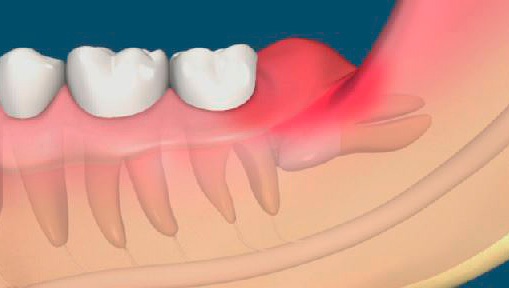
In addition to pain, gum swelling and redness are noted. Over time, pus forms under the hood of a wisdom tooth, the temperature may rise, headaches often occur, appetite decreases, overall health worsens, and weakness appears. When swallowing, pain can occur on the side where the wisdom tooth grows, sometimes the throat, ear, and even the entire jaw hurt.
With an increase in the amount of pus in the area of inflammation, the opening of the mouth worsens, which sometimes does not allow the doctor to fully examine the corresponding area of the gum, which caused such problems. Pain and other symptoms and signs associated with it allow the dentist to make a diagnosis - pericoronitis, or difficult wisdom teething.
Only a competent dentist can decide what to do with a growing wisdom tooth, from which the gum hurts and which grows incorrectly in more than half of clinical cases.
Photos of removed wisdom teeth:
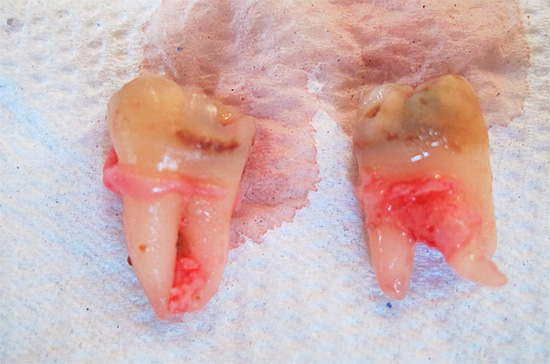
When teething wisdom teeth, they often are simply not enough space: they can grow sideways, as well as towards the nearest neighbor. Generally speaking, the lower wisdom teeth are the most problematic, since when they erupt, one or two tooth tubercles usually appear, covered with a gum, like a “hood”, under which, like in a “garbage can,” food is constantly stuffed and rotting there.
At first, this is manifested by the unpleasant smell of rotting from the mouth and minor pain when chewing solid food. Soon the pain in the gums intensifies, sometimes painful sensations arise in the cheek, adjacent teeth, jaw, throat, ear, headaches are provoked, and fever may rise.
The pain causes not only the feeling of "bursting", which creates a wisdom tooth in the gums by analogy with cutting milk teeth in children. There is the formation of purulent exudate (simply - pus), which does not find a way out from under the gums and rushes into the surrounding tissue. It irritates and squeezes numerous nerve endings, causing severe pain not only in the causative wisdom tooth, but also radiating (giving) along the nerve branches to other organs and formations (cheek, ear, throat, etc.).
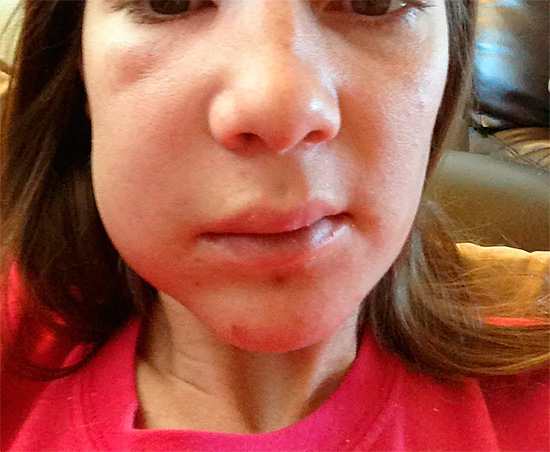
Why are wisdom teeth dangerous?
The wisdom teeth that cause pericoronitis carry a potential danger to human health and life.
Pericoronitis is formed against the background of the activity of bacterial microflora, which finds a favorable environment for life and reproduction under the gingival hood of the wisdom tooth. In addition to the formation of purulent exudate under the gum, often there is also a mechanical injury to the swollen gum area due to inflammation that covers the wisdom tooth, as a result of which erosions and ulcers form on its surface, worsening the condition of the surrounding tissues and provoking severe pain in the gum and cheek.
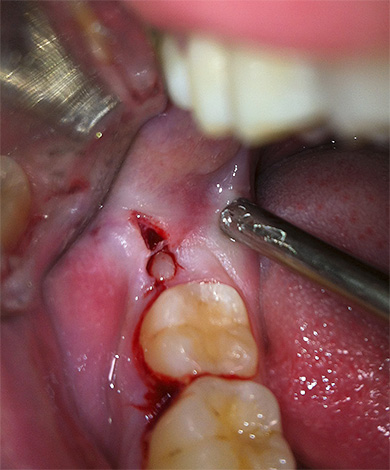
After a few days, purulent pericoronitis may occur, which is characterized by strong and constant pain behind the “seven” wisdom adjacent to the tooth. Pain may appear that gives into the ear and temple, and is also felt when swallowing like a “dental sore throat”. Against the background of local inflammation, the body temperature rises to about 37.5 degrees and the opening of the mouth is disrupted.
The submandibular lymph nodes enlarge and become painful on palpation. With pressure on the hood, pus is released - the cause of all suffering. Against the background of a hard to erupting wisdom tooth, redness and swelling of the adjacent cheek tissue, palatine-lingual arch and soft palate are visualized.
The acute phase of inflammation with high levels of immune defense and the breakthrough of pus in the oral cavity can turn into a sluggish chronic form, but after a certain time an exacerbation usually occurs. Due to a violation of the outflow of pus, a post-molar periostitis with severe intoxication phenomena may occur: an increase in body temperature to 38.5 with the inability to chew food against the background of difficulty opening the mouth.
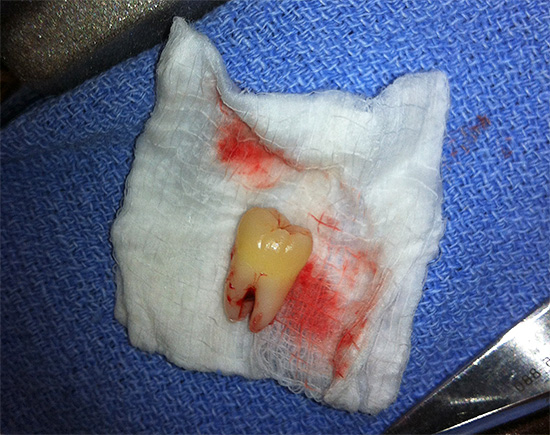
In such cases, the doctor observes the patient's asymmetry of the face on the side where the wisdom tooth grows, as well as pallor of the skin, enlarged and painful lymph nodes. The patient practically cannot open his mouth on his own, so the doctor has to open his jaw.
It's important to know
With the further spread of purulent exudate, there are risks of developing phlegmon and sepsis, which leads to the spread of infection to vital organs with severe intoxication, and this often leads to death.
The photo shows an example of phlegmon (acute spilled purulent inflammation):
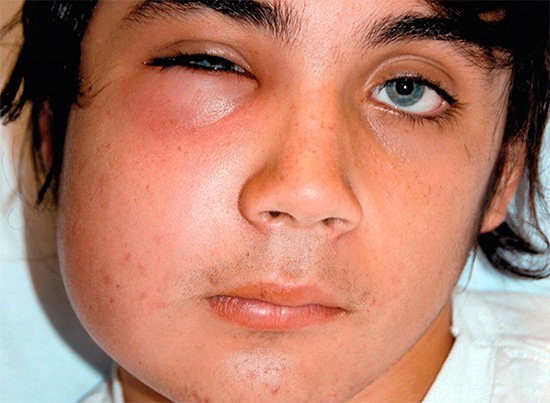
How to anesthetize a wisdom tooth at home: folk methods
Growing wisdom teeth (especially the lower ones) are insidious in the sense that in more than 60% of cases the jaw is located incorrectly. Almost always, the tilt is oriented toward the seventh tooth, which creates a lot of problems. First of all, this is pain.
Accordingly, when a teething wisdom tooth begins to hurt, many try to solve the problem at home and simply somehow anesthetize it. It is important to find a middle ground here: none of the dentists is opposed if a person tries to reduce pain himself, but do not forget that independent emergency care should not develop into a long-term treatment with “grandma methods”.
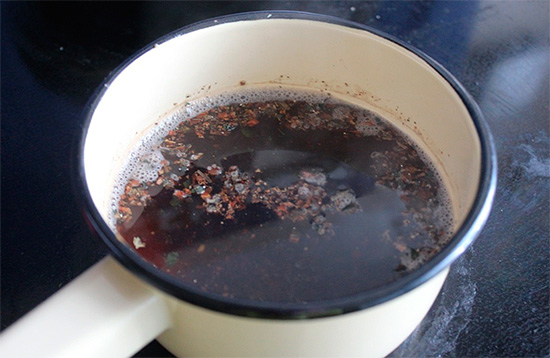
Considering the above warnings, let's look at popular approaches to solving the problem that are quite suitable for use in practice.
- If the gum hurts from a growing wisdom tooth, then you can take 2 tablespoons of sage grass and pour 0.5 liters of boiling water. Insist for an hour. After filtering, rinse your mouth with a warm solution until the pain decreases. Generally speaking, almost any warm rinse is very helpful in such cases.

- If the upper or lower wisdom tooth is sore and the gum around it is inflamed, then a decoction of oak bark can be used for home treatment - it has bactericidal properties. You should take 6 tablespoons of bark, pour them with 0.5 liters of boiling water and put on low heat. After boiling, you can also add 4 tablespoons of sage herb and after cooling, rinse with warm broth about once an hour. Such a decoction relieves pain rather well and, to some extent, antiseptic the oral cavity.

- According to another popular recipe, if a wisdom tooth really hurts, then you can prepare a decoction of turnips. To do this, take 2-3 tablespoons of chopped turnip, pour water and bring to a boil. Cook after that takes 15 minutes. Rinse your mouth with warm broth as often as possible.
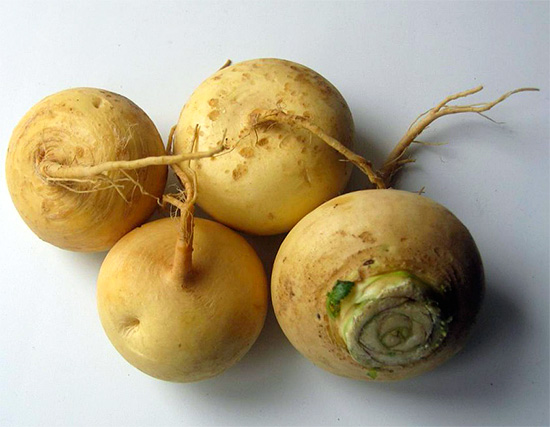
If there is no sage, oak bark or turnip in the house, then you can take advantage of what is always at hand: ordinary baking soda and salt are suitable. One teaspoon of soda and salt should be dissolved in a glass of warm water and rinse your mouth, the more often, the better - until the pain is substantially or completely relieved.
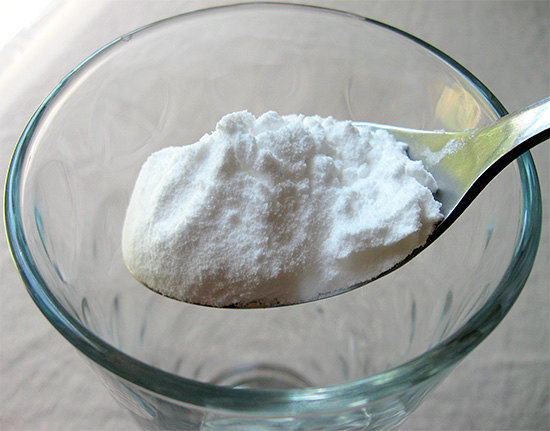
What to do with pain from a wisdom tooth if the above options for any reason cannot be implemented? Well, you can relieve pain with medications ...
Medication at home for pain in the gums from a growing wisdom tooth
The effect of the use of pain medications (Ketanov, Ketorol, Nurofen, Nise, etc.) is general and not very long - usually from 1-2 to 4-5 hours. There may be situations when painkillers do not work, and a person, in order to get rid of pain in the gum over a wisdom tooth, cheek or jaw, increases the dose of drugs by drinking a handful of tablets in a short period of time, which can sometimes lead to serious poisoning.
If the analgesic pill does not help, then you should not increase the dose, but it is better to simply change the pain medication to an alternative one. To date, pharmacies have a very wide range of them.
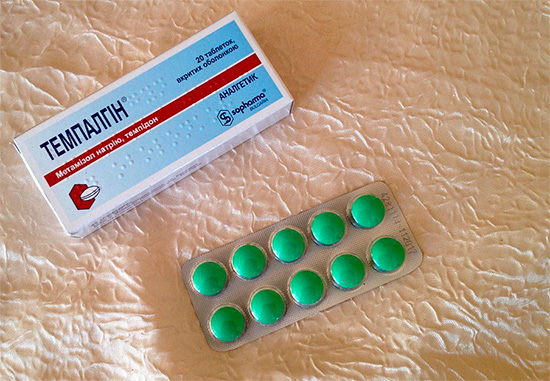
It is interesting
Oral and maxillofacial surgeons are currently resorting to the prescription of the etoricoxib drug, which is expensive in comparison with the usual analgesic pills, but long in its analgesic and anti-inflammatory effect. In the instructions for the drug there is no mention of dental problems, but he relieves maxillofacial pain perfectly. Moreover, its uniqueness is that it takes only 1 tablet per day, since its analgesic effect lasts for 24 hours, which reduces the toxic effect of the drug and the load on the liver.
For topical application, in order to reduce pain in the gums when teething wisdom teeth, antiseptic rinses with weak solutions of chlorhexidine and Eludril are also used. Spray and Angilex solution are used for painful eruption of both primary teeth and wise teeth in adults.
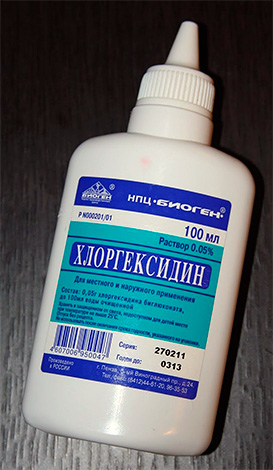
Gel “Kamistad” based on anti-inflammatory, analgesic and antibacterial compounds reduces bacterial activity under the hood, and also anesthetizes the gum above the wisdom tooth. The composition of the drug includes chamomile flower extract (antiseptic) and lidocaine hydrochloride (analgesic) with the addition of an alcohol solution.
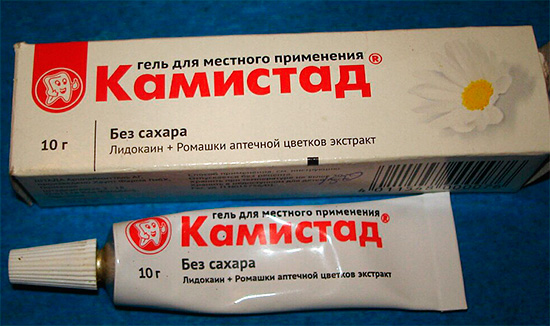
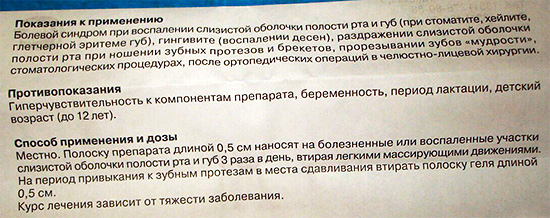
Surgical treatments for teething wisdom
Wisdom teeth can begin to erupt at almost any age: both at 16 and after 40. The first sensible thought that visits an adult in moments of acute pain is to remove a sick “wise” tooth at all costs, as there is every reason consider it unnecessary for a bite. However, in practice, after some time, fears arise before the removal operation, and the visit to the dental surgeon is eventually delayed, although the problem remains unresolved.
On a note
The fears that adults of the “old school” have before the potentially complex manipulation of removing a wisdom tooth (especially the lower one) are quite justified, since the generation that grew up in the Soviet Union remembers the methods used for complex removal. To separate the roots of the wisdom tooth when it was erupted incorrectly, then a chisel and a hammer were used. The procedure was, to put it mildly, unpleasant, and on the whole even very dangerous due to the risks of jaw cracks, head injury when the hammer came off, and it sometimes took hours, since the wisdom tooth could have additional roots bent under right angle. Currently, chisels and hammers are used extremely rarely.
In the photo - a wisdom tooth removed in parts:
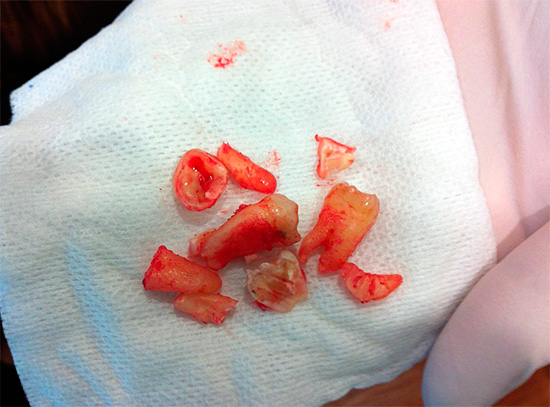
If removal of upper wisdom teeth, as a rule, does not cause difficulties, even if they grow to the side, then the lower ones are almost always a headache for an inexperienced dental surgeon and a whole art for a professional. This point is worth explaining. The fact is that the main merit of any competent doctor is not how quickly he grasped the scalpel, cut the gum or pulled a complicated tooth of wisdom with forceps, pulled a gauze swab on top and gave a frightened patient a good kick in the ass ( that is, politely said goodbye to him).
An important component of the professional approach is a full-fledged diagnosis, monitoring of the patient’s health, preparation for surgery and comprehensive monitoring of the postoperative period. Few practitioners can boast that each patient has an individual treatment program, understands why he is doing something, and what prospects await the person after these actions.
Any difficult teething of wisdom tooth with pain in the gum and surrounding tissues requires x-ray diagnostics. To determine the position of the tooth in the jaw (angle, structure, shape), an orthopantomogram (OPTG) or a panoramic picture of all the teeth on both jaws is used.
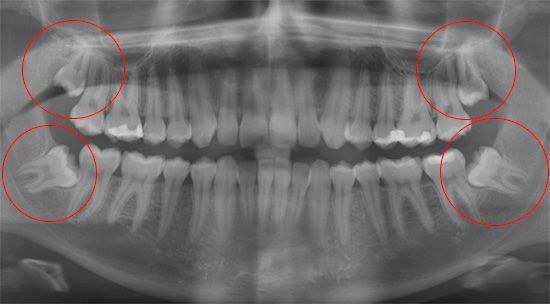
You can also take an aimed shot on a visiograph - a device that transmits an image to a computer monitor. After the dentist knows what he has to deal with, he plans an operation: he explains the risks to the patient, the approximate time of the procedure, the features of the postoperative period after the removal of the wisdom tooth, etc.
Before the operation, health monitoring is carried out: taking an anamnesis (history of the present disease, concomitant pathologies), conducting a general blood test, biochemistry, determining the blood group and Rh factor according to indications, etc.
From the experience of the dentist
Diabetes mellitus detected in a patient before tooth extraction surgery requires mandatory individual correction of upcoming manipulations. If diabetes mellitus is in the decompensation stage, then it is impossible to remove the wisdom tooth in a planned manner, and in an emergency, mandatory monitoring of the patient’s health by an endocrinologist is required, and often in a hospital. Long bleeding from a hole after extraction of a problem tooth may be a consequence of diabetes.
In some forms of diabetes, the hole does not heal well, so after removing the wisdom tooth and its roots from the hole, the dentist / surgeon should take the necessary measures. This disease requires a special attitude to the patient, correction of the underlying disease, so that the operation goes smoothly.
Let us return to the question of excising a hood with a scalpel over a wisdom tooth to help it cut through and relieve pain from soft tissue inflammation.
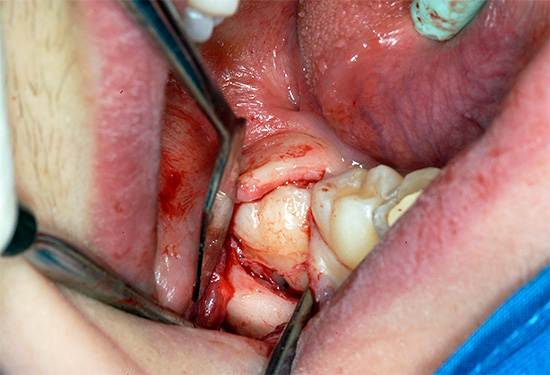
Most progressive dental surgeons, for whom surgery is not just a job, but a lifestyle and a real art, do not recommend doing what many years ago and still practiced in dental clinics and departments. Studies of this issue led to disappointing conclusions: the risks of repeated pain in the gums, jaw, cheek, throat and ear from the wisdom tooth after excision (cutting) of the hood above it are so high that they do not give doctors the right to take risks, playing with their lives suspecting patients.
In support of the research results, there are many examples of cases (both sensational and little-known), when excision with a scalpel of a gum above a wisdom tooth led only to a deterioration of the purulent process with the development of serious complications, up to the death of a person. When there are 100% indications for removal, and dental surgeons ignore them in favor of the conveyor approach without a full assessment of the situation from the point of view of modern developments in medicine, diagnosis, logic, then tragic cases arise.
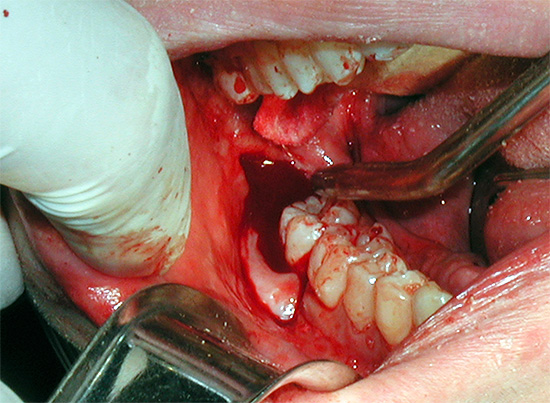
Dentist's advice
It is possible to apply the excision of the hood to relieve pain during pericoronitis only if there is no way to remove the wisdom tooth for objective reasons, namely: there are no tools for complex removal, insufficient equipment of the clinic or low qualification of the doctor. In other words, you can take risks when conditions for work are not created. However, a dentist driven into such conditions should measure the risks (include the head) of possible harm to the patient’s health and life. And if possible, culturally refer patients to their colleagues for the complete removal of wisdom teeth in case of their problematic growth with competent management of the postoperative period.
What other problems may await you?
Pericoronitis, or difficulty in teething wisdom, is a serious illness that can also lead to bite problems. Few people know that after pain in the gum and inflammation of the hood over the wisdom tooth, if it is not removed, malocclusion often occurs: displacement of the dentition. That is why those who are faced with difficult teething wisdom teeth for the first time, it is recommended to consult not only with a dentist-surgeon, but also with an orthodontist dentist (a doctor who deals with malocclusion).
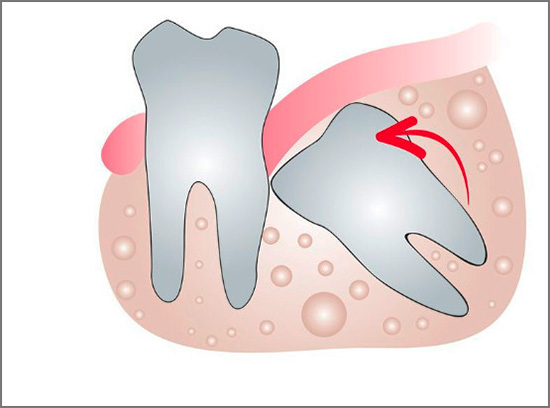
Often the lower wisdom teeth begin to hurt and hurt, but they are in no hurry to appear on the surface of the gums.In the pictures you can observe how the "wise" tooth is almost in horizontal inclination to the neighboring one, which is why in some clinical cases it also starts to provoke pain. Even in the wisdom tooth that has not yet appeared on the surface of the gums, caries and its complications can occur, since cariogenic bacteria easily go under the gum behind the penultimate "seven".
Wisdom teeth begin to hurt, not only due to problems during teething, but also after a successful complete or partial exit from the gums. They almost never have an antagonist on the opposite side, they are too far located in the jaw, often below the level of the seventh tooth, and as a result of this, their level of self-cleaning and hygiene leaves much to be desired. Therefore, caries develops quickly on the wisdom tooth, often with damage to the pulp chamber, accompanied by acute paroxysmal pain and long-lasting painful sensations from various irritants (pulpitis).
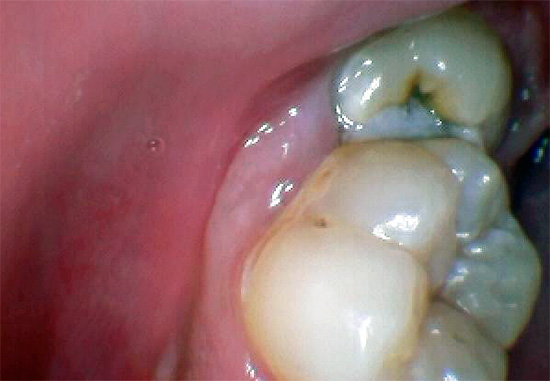
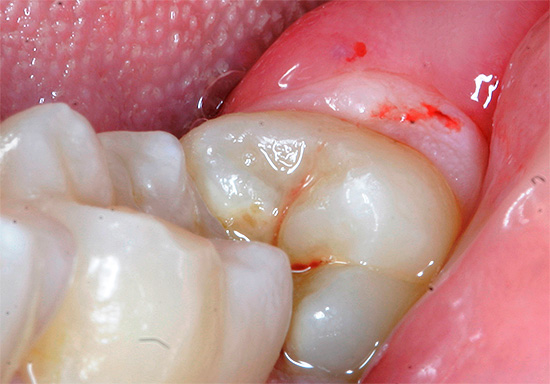
On a note
The role of preventive examinations in relation to predictions for wisdom teeth can hardly be overestimated. Competent orthodontic dentists know that already at the age of 15-18 years, it is possible to tell accurately from diagnostic images of teeth whether pericoronitis will be done and what can now be done with wisdom teeth that obviously do not fit in the jaw or are turned towards the seventh tooth. Usually, an incompletely formed tooth is easier and faster to remove than one that has a well-formed and branched root network. Even the alleged complex removal in a well-equipped clinic by a competent specialist takes no more than 10-15 minutes, and sometimes only 5 minutes.
Interesting video: removing a wisdom tooth (filming with a dental microscope)
What is useful to know about teething wisdom



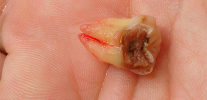
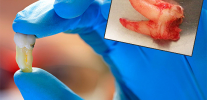
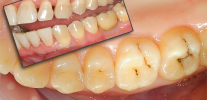
Thank you for the article!
Very helpful article. Thanks.
Thanks. They helped to decide to go to the dentist.
People, go to the dentist! My sister suffered for several weeks, rinsed, drank a painkiller. Then she gave up and went to the doctor, and there, it turns out, the wisdom tooth grew incorrectly, it had to be removed. They pulled it out, in fact, it almost fell down, because it was painful there, there was also pus, it seemed. I brought her a periodontocide gel, smeared it on Marlechka and applied it to the damaged place on the gum - her doctor advised her so that heals faster. But she forbade rinsing in the early days, she said that it could be done worse. In general, if the sister had not waited so long, everything would have been easier and faster. And so much tormented. It’s not worth joking with wisdom teeth! Better immediately to the doctor. You need to test yourself for strength!
Thank you for the article! Thanks to her, she decided to go to the dentist. He opened the hood, said he would bother us - we will remove it. Do not bear it - go to the diagnosis!
Two teeth grow on both sides. From the right, it started to feel terrible how to hurt, he almost completely got out! It grows correctly, upward, is no different from the previous ones. Beautiful, even.I think maybe we should tolerate it while it’s completely crawling through ?!
Hello Lily! In this case, you have a difficult teething wisdom tooth. Under the hood, which covers the posterior edge of the tooth, food is stuffed and rots. This enhances the inflammatory process and pain.
I strongly recommend that you visit a dentist who decides whether to wait, or it is better to take drastic measures immediately. Thus, you shift the responsibility to the doctor, who after examining your tooth will say: walk like that, or remove the tooth.
Without seeing your clinical situation, I cannot give you hope for successful patience and luck. Of course, most often even painful wisdom teeth teething takes place without complications and visiting the dentist itself, according to the principle: tormented for a couple of weeks - the tooth got out and stopped causing concern. However, if terrible symptoms appear: swelling of the cheek, difficulty opening the mouth, fever, severe intolerant pain, inability to chew, then you should immediately consult a doctor.
Yes, I went through that. Was pregnant at 26 weeks. And then the wisdom tooth begins to bother - I went to the hospital, they pulled it out for me and that's it. The temperature rose in the hospital, I can’t open my mouth, I can’t eat, it hurts to swallow. Then swelling of the cheeks. They put in the ChLH and did the operation.
Thanks for the article, after reading it, I was convinced that without a dentist in any way. There is experience in removing a wisdom tooth. On the other hand, after removal, I experienced terrible pain in the gum at the place of removal, but it's worth it! Better to remove and endure than endure the pain the next time.
Four months ago, the hood was excised because the bottom 8 erupting tooth was terribly ill. All this time, nothing bothered, but yesterday there was pain again, the gums turned red and swollen. I haven’t visited a dentist yet, but I can’t fully open my jaw. I guess it's time to see a doctor. Rinse with furatsilin and iodinol.
If this is in nature, then for some reason it is necessary. Nothing is superfluous. Even the appendix, as recently discovered, is not at all useless. And doctors say to remove because it is a more expensive procedure than just excision of the gums. It is necessary to profit from something.
Tell me what to do. A wisdom tooth hurts terribly, unbearably, and in our village there is no dentist.
Hello! If you want to hear something like something from me: “Talk to Baba Mani, who lives at the end of the village, or rinse with soda, salt, furatsilinom, pull your tooth out yourself, swallow a bunch of painkiller pills”, etc., I can immediately upset. Such advice can harm you, and if it helps for a while, it’s until the next exacerbation, up to the spilled "flux" and the operating table. If the village does not have an operating table, then you can "play the box." Hand on heart, Dmitry, I associate this with a well-known male question: “What should I do, people: a car has broken down in a field, there is no connection, there is no money, I can’t fix it myself, but for some reason does the Internet catch it?”
Namely, thanks to small villages and villages where there are no doctors, the survival statistics for certain medical problems are sad, BUT the most daring and strong-willed people ask a blacksmith to remove a tooth under local anesthesia for a pile of thanks, and the smartest and most advanced ones go by the neighboring car or go 200-300 km on foot to the nearest stop to arrive in a regional center or city where there is a dentist and remove a tooth, so as not to deal with its multi-stage treatment, but to protect yourself from the complications of a problem tooth.
In principle, these wisdom teeth are most often removed according to objective indications, so that you will win this from a medical point of view and territorially.I must say right away that it is not necessary to specially record for acute pain - many doctors make emergency deletions. If money is tense, then in the hospital and clinic almost always do this for free (or almost), but the anesthesia is appropriate - according to the compulsory medical insurance. If you are confused by the range of transitions to a doctor, then on the Internet you can find many people who, for the sake of saving on dental care, arrange entire migrations over many hundreds of kilometers in order to receive high-quality care, and even at low prices.
If you are sure that you are lucky with folk remedies, then this will only be on your conscience, since real medical care can only be provided by a specialized doctor, that is, in this context, a dental surgeon.
Tell me, please, a week ago we did the excision of the hood, the mouth became a little easier to open already, and the gum, it seems, does not hurt, but it doesn’t give to the temple, and the temple hurts even more than the gums. Is this normal or should I see a doctor?
Hello Irina! I'll start with my poem:
From the lower teeth, the pain is directed to the ear,
In the back of the head, in the temple, in the upper tooth gives,
From the top - “to the bottom” - this is bad luck:
And in the cheekbones, in the "eyebrow" - he doesn’t sleep like that!
Of course, that the features of irradiation of pain are not always amenable to this formula, but often. Why did I say that it’s not always: it is in relation to the difficult teething wisdom tooth (the lower one was “processed” after you), which creates the feeling that the whole jaw, ear, throat, head, etc. hurts in unison with the gum around the tooth.
I think that just in case, it is worth contacting the dentist in view of a possible coincidence: what if there is a carious upper tooth opposite the wisdom tooth? In general, I am not a supporter of the excision of hoods, since you need to keep in mind the risks of its possible re-growth over a certain period of time (from several months to several years). I repeat that this does not happen often, but there is a risk.
Thanks for the answer) But then what measures to take if not excised? Pull a tooth out?
Hello Irina! It is best to remove a problematic wisdom tooth, especially one that erupts outside the dentition. And the details, apparently, were written to you by my colleague, Yuri. Look in the lower commentary: there Yuri writes about problematic wisdom teeth, the hood of which has been "cut to the point" many times. However, it is worth remembering that a number of dentists regard the removal of wisdom teeth as a source of income, making an extra charge. So look for honest doctors.
Thanks! A couple of problematic wisdom teeth were removed at one time, it became much easier without them, and even the hood was incised several times. Now here again, on the other side, a new, wide one is coming, although it is going exactly, but it stands low and seems to put pressure on the neighboring ones, and the gum aches, behind the back wall. Once again I do not want to incise, I’ll ask you to remove it immediately !. And then the distortion and displacement of adjacent teeth, I feel, will cause. This is a sign of “atavism” from monkey-like ancestors, the poet’s wisdom teeth - they are so superfluous. Chewing function is not created. And let the dentists correct, in my opinion, even when installing braces. Competent experts advise removing all 4 wisdom teeth so that there is no jaw asymmetry!
Six months ago, the wisdom tooth began to erupt and the gum inflamed. I went to the doctor. Notched the hood. Now the tooth began to grow and the gum was inflamed again and the cheek was swollen. Is it worth going to the doctor, or does the tooth grow and the pain goes away?
Hello! Modern protocols and recommendations “direct” such cases to the mandatory removal of a wisdom tooth. In most cases, they are not even advised to cut the hood for the first time, as this is fraught with risks.In this context, you confirm with your clinical case that it is more expedient to immediately carry out the removal of wisdom teeth with pericoronitis - difficult eruptions than to perform plastic surgery of the hood over the 8 tooth.
If you are willing to risk your health and wait for the weather by the sea, then you can not go to the doctor. Otherwise, it’s worth it.
A wisdom tooth comes out, it hurts terribly, I feel sore throat, it is very painful to swallow from the side of a sick tooth, my mouth opens, but with pain. Very afraid to cut through the hood. Tell me what to do so that there is no severe inflammation, so that, God forbid, pus does not appear?
Hello! The most reliable way to help in this situation today is to remove the tooth with this diagnosis. Pericoronitis, or difficult teething of wisdom, is an insidious disease. Indeed, you are right that “pus” may appear.
Excision of the hood is still carried out by many dental surgeons. This is only at your own peril and risk. Current trends do not give me the right to recommend you the latter because of possible complications, even if the percentage of such cases is minimal. Deaths have already been recorded due to useless and repeated excisions of the hood instead of the complete removal of the wisdom tooth. It all depends on many factors, but the risk must be justified.
I cannot but say that only a competent specialist who has specialized in this field for a long time and has a good base can remove such a wisdom tooth with minimal consequences. "Consequences" - you ask me? Of course, this is an operation to remove a wisdom tooth. Although often performed under local anesthesia. As far as I know, the operation to excise the hood, at least, does not provide instant relief. The inflammatory process against the background of an injury can bother about 2-3 days, and very much. Also, do not forget that by removing only the hood, you do not deprive yourself of the risk of possible complications, since no one knows if working with a tooth alone will help a tooth with a scalpel.
The decision is still yours to make, and you should turn to a professional maxillofacial surgeon.
Hello, I encountered the same problem, the lower part of the jaw hurts. I went to a local clinic today and got an injection: first, novocaine, and then some kind of antibiotic. Then he decided to check whether he did the right thing or not. In general, the second day I can’t normally open my mouth and chew food, a sore throat! What can you advise? Thanks in advance.
Hello! Unfortunately, in order to analyze the situation, there is not enough information: what was done with the tooth, was there a reason in the gums, why was the antibiotic injected, etc.? In general, novocaine is almost never used for anesthesia. I would not advise to apply again for an appointment where this drug is used for anesthesia. In general, I ask you for specifics on this issue, then certain answers will be outlined.
Wisdom teeth grow 8 sideways painlessly, but on the other hand I’ve been tormented for a week, it hurts, I don’t have any strength ((The tooth erupted a little in half a year and that’s all ... I went to the dentist, said, I did physiotherapy for a week (I didn’t, there was no way). Hood! A weekend is planned, but I can’t take it anymore ... They don’t take it ... The jaw hurts, and it feels like the whole side of my teeth hurts, part of my face burns with fire! Advise me what to do?
Hello! I think that self-medication is fraught with many risks, and anesthesia will bring only temporary prosperity. I am sure that in your city there is round-the-clock dentistry (private or public), which can provide emergency assistance.
Knowing your situation as described, I can assume that it will be risky for you to excise the hood. That is, you run the risk of "sending" the infection deep into the maxillofacial region. Modern dentists-surgeons with difficult eruption (especially, with a tendency to tooth growth “crooked”) wisdom teeth are strongly recommended not to carry out the excision of the hood, and immediately remove the obviously problematic tooth. I believe that this is quite natural and will immediately save you from future problems.
I want to warn in advance that after removing a wisdom tooth, comfort will not come immediately: there may be pain in the first days after removal and even a slight swelling. However, almost always after the excision of the hood, the same thing happens + the risks remain that the wisdom tooth will give many problems in the form of complications (deaths are known).
Thank you for such an interesting article, it helped me a lot, and figured out the symptoms. And I can’t understand what’s the matter. I thought, froze, or had a cold drink, now it’s clear what is the matter. And the video is great, now I will know how the removal process is going. Oh, wait for me, the dentist, a long time ago did not go to him.
MANY THANKS. I can’t really speak, the throat is swollen on one side. The doctor says: "To the end did not crawl out, endure." You can’t drink medicine, I feed the baby with breast milk. Soda and salt help reduce pain for 15 minutes, I will try your other tips. Thank you for the article.
The wisdom tooth was removed, the removal was difficult, all the wisdom teeth could not erupt. The gums were sutured, on the 10th day the stitches were removed. Today, 2 weeks have passed since the operation, and the smell from the mouth bothers me. Although I make baths of chlohexidine, the smell remains (On the day the stitches were removed, the doctor washed the wound and said that everything heals well) But what to do with bad breath? Do I have any kind of inflammation? I'm still afraid of complications ((
Hello! I assume that the wound remains a source of food retention. I recommend that you turn to an independent expert dentist for a consultation in the clinic to find the reason: it is not enough just to have oral information here, but it is important to conduct a detailed examination in the oral cavity. Perhaps there are carious lesions on the teeth, the wound itself is filled with food debris, orthopedic structures in the mouth have become unusable, etc.
I sit and cry. Because there is no more strength. It all started with the fact that the mouth ceased to open. She went to private dentistry, without examination, was diagnosed with inflammation of the temporomandibular joint, prescribed voltaren in tablets, a warming ointment, compresses. It was treated a week in this way, pain began, and eating is still impossible. I went to the dentistry at the place of residence. They made an x-ray, but of poor quality, in the picture there are 2 wisdom teeth, and the joint is not visible. They continued the same treatment, adding UHF therapy and amoxicillin. The pains became intolerable, painkillers - ketorol, papaverine, prednisone, analgin stopped the pain for 2 hours. Tormented for another week. The question arose about closing the sick-list. We decided to send to the region, but to begin with, go to another dentistry. They took a picture on the visiograph, saw 2 teeth on the left, top and bottom, could not figure out which one was to blame. They opened their mouth by force with a spatula, but not enough, then they gave 3 injections. Hooked on top and bottom of the hood. All this was accompanied by such pains that it is easier to give birth 10 times. Ceftriaxone was administered 2 times. And that’s all. 2 days have passed. The pains are unbearable. The mouth does not open at all. Everything hurts: jaw, ear, throat, temple. Constantly rinse my mouth with chlorhexidine, soda, salt, smear gum with chrysalis, there is no analgesic. The day after tomorrow they close the sick-list. If I live. Please help, tell me what to do next? I ask you to.
Hello! The fact that you have been “cut” by the hood is a vicious practice. Most practicing maxillofacial surgeons are against this technique and strongly recommend removing wisdom teeth. Especially with difficult eruption of the lower eighth teeth. I think that you should urgently remove the problem wise teeth, if any, as you are greatly risking your health.
As for pain relief: I recommend to run away from dentistry without a look, where they make it “10 times easier to give birth”. To hurt a person in the dentistry of our time is highly unprofessional. If it is difficult to open the mouth, there are techniques for external anesthesia (or) to relieve muscle spasm for anesthesia in the oral cavity after it begins to open normally.
The bottom left eight erupts. Six months ago, the hood was excised, they said that you can not remove it, because grows evenly and does not interfere with other teeth. Recently, it began to grow again - it hurts a lot, the gum swells, a sore throat on the same side - as if pulling, a little pus stands out from under the swelling. I smear with chrysalis, rinse with chlorhexidine and drink ketorol for pain relief. Am I doing everything right, or is it necessary to remove a tooth?
Hello! I think that you risk your health, although most often you are lucky, rather than serious consequences. By your example, you prove the correctness of the recommendations of practicing maxillofacial surgeons for removing a wisdom tooth when it is difficult to erupt without excising the hood. That is, the excision of the hood is considered only a temporary measure, although for some patients this treatment is quite suitable. But how to guess whether such a vicious practice will be useful to you?
It seems to me that you fell into the category of patients who should remove the tooth with all 150%.
I have a problem, on the right side the 8th almost (there is a little bit left) has grown, but here on the left side from the bottom it started to hurt. Moreover, it is growing quite normally, without deviations, as on the right, but it still hurts. The gum itself near the tooth also hurts, I can’t chew, when the jaw closes on the tooth, the gum starts to hurt. But I can calmly open my mouth, my throat does not hurt. What to do?
Hello! I can voice one definite answer and several alternative ones. Definitely, it is to consult a dentist-surgeon (or maxillofacial surgeon) to check a tooth for a serious inflammatory process. In absentia, I can assume anything, but the look of an experienced specialist can often avoid a lot of problems.
As for your situation: as long as the wisdom tooth cannot cut through the “hood”, it is a hostage to this problem: when chewing, the gum is constantly damaged and scarred. So far, your initial stage of pericoronitis (difficult teething) is not a concern. This can be a catarrhal form, that is, without purulent contents under the hood and without characteristic bright symptoms of purulent inflammation. If food begins to actively fall under the hood and rot there, it’s not an hour, there will be problems. Better to do everything as it should.
And now about how it should be. Here, opinions were divided: some doctors suggest monitoring the situation, but limit themselves to only home treatments and examinations once every so many days. More categorical people think that a problematic wise tooth should be removed, because there is no place for it, and the hood is a time bomb, a source of hygiene and life comfort. The last category of doctors (and there are also a lot of them) believe that you can just perform an excision of the hood, and the tooth will cut through itself for several days or weeks, and there will be no harm.However, opponents of this method have repeatedly come across the fact that after such excisions in some people, everything repeated again, or it got worse.
I think that I have explained the situation on this topic, but still choose you. Health!
When a tooth is cut, the Solcoseryl paste helps very well in pain. And if the tooth is removed, then then you can smear the hole with it so that it doesn’t hurt (if only it wasn’t sutured).
Wow, so much attention here! I read everything, thanks a lot for the information)
Just recently, this wisdom tooth began to be cut with me! It’s wrong, even scratched his cheeks. And then also the gum got sick. As a result, everything was not so much painful as it was disturbing and annoying! I turned to a familiar dentist, on which he advised me to take gramramidine, which will relieve all this pain. I obeyed him and eventually began to dissolve the tablets and thanks to them it became easier, it turns out that they also relieve pain. As a result, the tooth continues to grow slowly, but grammidine made this process softer)
I am 11 years old, the tooth seemed to begin to fall down the gums, and the gum is slightly swollen, but is not visible on the outer cheek. The gum in the lower jaw of the last row hurts. 5 days ago it started to hurt and now, when I touched the tooth, a small part of the tooth fell off and was soft. What to do? Tell me please?!
Hello! I dare to suggest that you have a decay of the walls (walls) of the last tooth, probably the 6th, as the 7th teeth usually erupt at the age of 13-14. The gums, accordingly, are trying to take a place (emptiness) in the carious tooth, since nature does not tolerate emptiness, and the tooth will not begin to give severe pain today or tomorrow. That is why it is important to consult a dentist in time for a tooth treatment so that later you do not have to remove only the roots. Thanks for the question.
Hello! I read everything, and the symptom is the same for me, the pain is simply unbearable. So there is also the floor of the tongue and lymph nodes hurt, and inflamed. I went to the dentist, the doctor said to wait until the tooth erupted, and rinse with soda! I don’t know how to be, the pain is unbearable, it gives to the upper part too. Tell me, please, what to do? Thanks.
Hello! There is everyday logic and professional. Moreover, a number of dentists clearly suffer from bouts of worldly logic, but only until the first serious case. I mean, during the difficult eruption of the lower tooth of wisdom, many unpleasant moments occur, but often this is accompanied by the production of pus under the hood, which covers this same tooth. Whether rinsing with soda (or some other folk remedy), or using ointments, gels, solutions - all this falls into the category of “Russian roulette”, although, judging by the practice of many dentists with everyday logic, there are many more happy cases than with a miserable ending.
A person has immunity, and his help is not always limitless, moreover, stress, other illnesses in the body, hypothermia, overheating, etc. can be imposed. Fatal cases from neglected pericoronitis are and will be, as long as there is a cohort of dentists with a slight look at this problem (that is, they wait - maybe it will erupt normally and everything will resolve itself). Personally, I am sure that there is a middle ground. This is when, after examining the patient, you can immediately understand: immediately remove the “floating” tooth in the pus (maybe even in a hospital with maxillofacial surgery), or (with a slight marginal inflammation of the gums) wait 1-2 days, but taking into account competent recommendations and turnout every day for examinations. Ideally, the problem with each next day should not provoke an increase in pain with serious signs of inflammation (edema, fever, inability to open the mouth, etc.).
Regarding the ability to excise a hood over a wisdom tooth and enjoy teething for a certain time (1-2 weeks): in principle, many doctors practice such help, and almost always it is successful, but often distant. After excising the hood, almost every first one has to suffer a few days with the same unbearable pain.But this is taking into account the fact that before the incision was made, a purulent complication did not begin, deep in the jaw spaces, because it would otherwise be in trouble. On the whole, it’s 100% accurate to guess whether a person has a high probability that a simple cutting of the gum will help in a particular clinical situation, taking into account whether the tooth is correctly oriented for eruption (maybe it lies sideways or rests against 7 tooth root), not a single dentist will be able to, even with great experience.
That is why a large group of dental surgeons around the world prefers to solve this problem categorically (professionally) in many ways: to remove a tooth with difficult eruption and, thereby, precisely help the patient. A large number of doctors with worldly logic and patients who say something like: “I was told to remove a wisdom tooth with a hood, but I suffered a couple of weeks, he festered and festered and went out through the gum, now I can live, and the tooth is in place. "
As they say, to each his own, but it is worth remembering the deaths with running pericoronitis and adequately assess the risks.
Hello! A month ago, suddenly and inappropriately (at work and 3 days before the wedding), a wisdom tooth located in the lower jaw began to cut. There was pain, which after a couple of hours became terribly unbearable. It gave in to the temple, and the entire right side of the face (where the tooth itself is) was just hellishly sick. She took what was at hand - analgin. After 6 hours, the pain subsided. The next day I went to the dentist. Took a picture. Inspected. It grows exactly in the picture, the adjacent tooth does not support. Ketorol or ketans were prescribed for pain. An anti-inflammatory drug (which I usually take for allergies). Rinse your mouth with soda. After that day, the next time he fell ill only after a week, but not so acute. And then there was no pain for a week and a half. Then again the pain. And so with a frequency of 5-10 days it hurts for 2-3 hours. All that bothers me is pain. Cuts and itches. I can’t sleep. Painkillers do not help. At least I took ketorol first - it did not help. Half an hour literally, and the pain returned. And since in the instructions it can be taken only with an interval of 4 hours, I had to endure. You will laugh ... But water helps me to relieve pain for a short time. Just pick up water in my mouth and sit. I do not know what to do. Again go to the doctor and complain of pain? Tolerate while he erupts? And how long does a wisdom tooth last? What would you advise to do?
Hello! Just in case, I’ll draw your attention to a possible nuance: what you describe is very similar to the symptoms of pulpitis or periodontitis of a tooth (not the wisdom tooth that is still erupting). Especially this is clearly indicated by the fact that water, while it is cool, relieves pain. In principle, you did not describe the classic development of the clinic for difficulty in teething: pain when swallowing, sore throat, difficulty opening the mouth, pain in the gums over the wisdom tooth when chewing, etc. Perhaps it makes sense to look for hidden carious cavities on the lower 6 and 7 teeth, since at first the symptoms of radiating pain in the temple on the right side indicate, according to the observations of the researchers, the lower tooth. Moreover, you say "the wisdom tooth grows evenly." Perhaps this tooth of wisdom has nothing to do with it.
Hello! A year ago, my wisdom tooth began to cut. I went to the dentist, an incision was made to me, the tooth erupted. And now, a year has passed, nothing bothers, but now, a year later, he started to hurt on the other side - he cut into half. If they cut me again and won't bother anything, do I still need to remove them? Please advise.
Hello! The question is not so simple.Many maxillofacial surgeons believe that wisdom teeth bring nothing but problems in the future. However, there is such a thing as functioning wisdom teeth that help a person chew food normally. Another important point - they are often used as a support for prosthetics, when it is important to put, for example, a bridge. Therefore, many orthopedic dentists also rely on having a normal end tooth. However, girls, according to statistics, most often have little space due to the miniature jaw so that these wisdom teeth can occupy their normal position. Therefore, they often erupt to the side, bite the mucous membrane of the cheeks, or cannot penetrate at all, as they abut the roots of the adjacent 7th tooth with their crown part.
Since you mentioned that one of the lower teeth of wisdom safely found a place in the jaw, it’s hard for me to say anything. Naturally, his “behavior” may differ from the symmetrical eighth, which, for example, can rest against an adjacent tooth and become a problem for the future. That is why without assessing the condition of the tooth by an x-ray, one cannot accurately judge the current situation. Moreover, the technique of incising the gingival hood from the point of view of most maxillofacial surgeons is controversial, despite its often successes.
Bottom line: you need an individual assessment of the wisdom tooth in the dentist’s chair, after which the decision will be made whether it is worth risking health for the long term and whether it is advisable to keep the tooth at all.
Hello! 3 days ago a wisdom tooth ached, on the right on the lower jaw. I can’t open my mouth, my right throat hurts. I visited the dentist, as my mouth could not be opened completely. After examining it, the doctor prescribed me dexalgin (25 mg), ampicillin (capsules), and loroben (rinse), saying that in a couple of days it will pass and the mouth can open for the picture. I can’t chew and sleep normally. Tell me, please, is it possible to somehow open your mouth under a drug for further examination? And is tooth extraction possible even if it grows correctly? I am 39 years old. Tell me please. Thanks in advance. Thanks!
Hello! Personally, I believe that with a difficult mouth to open due to a wisdom tooth, the latter should be urgently removed, and local “poultices” can even do harm, as precious time will be lost. More than sure that anesthesia will be possible to remove the tooth. If the mouth can’t even be opened with difficulty, maxillofacial surgery at the regional dentistry, university or a large dental center have extraoral methods of anesthesia, as well as techniques that allow the mouth to be opened without the need to open the jaws with the necessary drugs. Therefore, in answering your question: in your case, the wisdom tooth, even if it grows correctly, is recommended to be removed rather than not removed. This conclusion is based on your description, the rest - in fact after a medical examination. It is better to have the opinion of a reputable maxillofacial surgeon, and sometimes even the opinions of 2-3 doctors (but after a careful examination in the chair, which is important).
Tell me, please, a wisdom tooth is climbing, it hurts about the second day. Chewing food hurts, opening your mouth hurts, your gums don't bleed. The back wall is white in place of the crawling tooth - as I understand it, the gum dies. The tooth is not visible as it grows, but the upper jaw itself hurts before the bug. It’s not that it hurts, but itches.
Hello! I suppose pericoronitis is a difficult teething of wisdom tooth. Obligatory consultation of a dentist-surgeon is needed, as:
1. The tooth can erupt with an inclination towards 7 teeth (this situation is highly undesirable);
2.Sometimes this process becomes purulent, which is not always manifested by acute symptoms, but leads to the spread of edema and intoxication of the body. That is why to calm down and immediately say something like: “Don’t worry, a tooth from the gums will appear, everything will pass”, - I, by virtue of knowing this topic from practice, have no right. Without examining the oral cavity and analyzing the image (the direction of the tooth and the orientation of its roots in the jaw space), it makes no sense to say something positive or negative, and even more so, to prescribe home treatment methods. Thanks for the question.
Hello, the second day hurts, I can’t open my mouth. The upper left tooth got out, but not completely. A little swollen cheek. Now it’s painful to swallow. At the reception in 3 days. Tell me, what can you temporarily anesthetize?
Hello! The situation is not typical: usually these symptoms cause eruption of the lower wisdom tooth. Be that as it may, it is definitely not worth delaying a visit to the dentist.
As for pain relief, specific drugs are not prescribed in absentia via the Internet. But doctors' advice on this revolves around painkillers and local gels, like those prescribed for teething. Sometimes antiseptic rinses help, but all this is extremely short-lived, often only for 1-2 hours. It is important that you resolve the cause of the problem as soon as possible.
Good morning! Three days ago, a wisdom tooth was removed on the left in the lower jaw. After an X-ray, he was sawn off the jaw, as he had grown into it. The doctor inserted a rubber thing into the hole and said to chew on the other side.
Appointed for inspection after 6 days. Three days have already passed, the pain does not go away, I take Next, after a meal I spray Miramistin. I feel bad taste in the area of removal. What can you advise for a more rapid passage of aching pain, or only time will help me? I take an antibiotic too. Thank you in advance for your response.
Hello! After such complex removal, severe pain can last up to 4-5 days, and the symptomatology depends on the level of invasiveness of the operation: the more damaged the tissue, the longer the primary healing phase will be. Especially often, the pain intensifies due to the open edges of the bone and, in general, with the "open" hole. The fact that you have been given a drainage (gum) suggests that there may have been a purulent process, or the doctor just wants to play it safe from complications. The unpleasant taste is associated with drugs placed in or on top of the well to accelerate healing and prevent alveolitis.
The fact that you regularly follow the doctor’s prescription is wonderful, as well as the fact that the dentist is ready to control your situation by appointing 6 days after removal for an appointment. To relieve pain, in addition to painkillers, I can advise anti-inflammatory, enveloping and accelerating wound healing gels and ointments, but it is better to consult a doctor with a personal appointment about the feasibility of using a specific remedy.
Hello. I got a wisdom tooth - in the place where the molar fell out. The pain does not bother, but there were small ulcers near him, as I bite a part of my cheek while eating. Need to urgently go to the doctor? Or can you heal with antiseptics?
Hello! Normally, a wisdom tooth erupts at the end of the dentition, that is, it is located behind the seventh permanent tooth. But in rare cases, it can actually cut through almost in place of the previously removed seventh tooth.
When biting a mucous membrane with a wisdom tooth, its removal is desirable, since chronic ulcers are not brought to good. Not only are they simply painful, but there is also a risk of them developing into malignant formations.A doctor should be consulted urgently, since it is best to timely eliminate the cause of the problem. Antiseptics are a temporary and useless idea: until the next decent bite. In some cases, it is possible to polish the tubercles of the wisdom tooth, but this is not a very effective measure - it should be determined by the doctor according to the situation.
Hello. I am 13 years old and my wisdom tooth is growing (on the right side). A hood formed, at first it was elastic, it hurt very much, but now it’s soft - it hurts less. I went to the dentist. He said that a tooth develops normally, if it is very painful, then it can be cut out. And now, it seems to me, it doesn’t hurt, but suddenly ... What do you think, to go to the operation or wait?
Hello! I recommend that at the stage of teething wisdom, still, after a while, consult with your doctor again, that is, undergo a follow-up examination. If everything is in order, then you can continue to observe its successful eruption. It would be nice to have a picture of the wisdom tooth, so that there was an idea of its direction. Sometimes it happens that it grows to the side, and the absence of pain and other symptoms is only temporary well-being. Therefore, diagnosis is so important. So the likelihood of surgery depends on the diagnostic results. Thanks for the question.
Well, in general, I went to see what to anoint or drip on the gum, and here such tin. I’ll probably go to an ambulance. Internet damn it ...
Hello! A month ago, a tooth ached and a cheek swelled up ... I went to the hospital and said that a wisdom tooth was growing. They made an incision, deflated pus. It seems to have passed. A month later, the cheek began to swell again, pus appeared. I try not to drink painkillers because is pregnant. What to do? Can I do anything at home?
Hello! Urgently run to the dentist-surgeon (and better - to the maxillofacial surgery) to remove the wisdom tooth. If this “half measure” (excision of the gum hood over the wisdom tooth) does not help, then in almost 100% of cases it is urgent to remove the tooth, as it can cause the spread of purulent inflammation (and even death, as it sometimes happens). My words are not an empty bullying of a patient. What you are describing is serious, believe my experience and knowledge. Once you have tried this procedure, it did not help. Once again, everything can pass and less successfully. For example, phlegmon of the submandibular region may begin. So go see a doctor immediately!
Hello! I have this situation: on one side, a wisdom tooth has half-come out, the rest half is under the so-called hood. Got out exactly, does not rest against anything. Throughout the year, I regularly followed this tooth; every day I carefully cleaned the hood area with an irrigator. The last two days there was a strong aching pain, no swelling was noticeable, but the gum over this tooth is very painful and gives along the entire right side of the face. What do you advise to do in this case - remove only the hood, or will you have to remove the entire tooth? ((
Hello! The situation is ambiguous. Firstly, you already emphasize that you have been caring for a wisdom tooth for a year so that, God forbid, it is not prematurely removed. That is, you definitely want to keep it for many years after full teething. On the other hand, if there are problems, is it really cutting through perfectly? Maybe he is at some inclination to the adjacent tooth, which makes it difficult for him to move normally?
Be that as it may, the images of this tooth should be analyzed, the risks of purulent edema after examination in the oral cavity should be determined, and only then a diagnosis is made and the doctor expresses his opinion. If the doctor advises you to remove the tooth, but you do not want to (despite the risks involved), then you have the right not to remove or sign the consent to this medical intervention.
As for the "cutting" of the same hood: this technique is practiced in many dentists of different levels, although not all specialists welcome it because the result is not always positive, and the risks to the patient's health remain. Again, this procedure will help or not, depends first on the position and direction of the tooth, and then on the reactivity of the body and its compensation capabilities. If something goes wrong - then patients strongly regret that they did not immediately delete it. So the decision is made on your question only with pictures, only in the dentist's chair and only with your consent after all the pros and cons are weighed.
Good afternoon. A wisdom tooth began to erupt in the lower right. Previously, the pains were periodic, now it has become more painful. It can be seen that the tooth climbs far enough from the last. Should I go to the doctor, or wait until he gets out?
Hello! It is best to consult a dentist-surgeon to assess the condition of the tooth, including the picture. This is done in order to understand the direction of tooth growth (orientation in the jaw) and general condition. If a tooth, roughly speaking, erupts “crookedly”, especially in the direction of the adjacent seven, then it is better to remove such a wisdom tooth so as not to risk health. It is also advisable to remove those wisdom teeth that are directed to the side of the cheek - sideways. This is done in order to avoid further permanent injury to the cheek, and the tooth can erupt very problematically, up to the infectious process.
Previously, those wisdom teeth that caused swelling of the gums and severe pain (pericoronitis) simply cut off the “hood”, but now many doctors do not risk this procedure, but prefer to remove it immediately. Here the approach is exclusively individual, therefore, you need to go to the doctor, and there they will already assess: whether it is worth waiting for the tooth to “come out”, or already there is a danger of suppuration or eruption of eruption (which means urgent removal).
Hello. Tell me, please, how it will be better: if the tooth hurts badly, cut the hood with the growth of the wisdom tooth or still remove the tooth completely? The pains are already simply unbearable ... Severe headaches, jaw ache severely and mouth really can not be opened, and there is no appetite. Her cheek was swollen, her patience was gone, both physically, morally, and spiritually. That just did not try according to old methods, temporary pains and again worse and worse. And does it hurt when a wisdom tooth is removed? What do you suggest? Thanks for the help…
Hello! In violation of the eruption of a wisdom tooth, in many cases it is removed (the lower ones are almost always). Pericoronitis is a condition that often turns into a serious purulent complication, so many doctors oppose excision of the gingival hood, considering it an ineffective measure. Although sometimes this procedure benefits those wisdom teeth that more or less penetrate evenly, they can hardly pass through a thick layer of tissue (especially with its distal section). However, an attempt to excise a hood with “crooked” going teeth often does only harm. That is why it is worth contacting a maxillofacial surgeon or a dental surgeon so that a picture is taken and an assessment of the situation is made.
If the tooth is to be removed, then anesthesia is used so that it does not hurt. In the performance of a good doctor, tooth extraction should not normally be painful.However, not all doctors are fluent in anesthesia techniques, so I recommend finding an experienced doctor.
Hello, here I have removed the teeth of wisdom - both from below and from above, because I was very disturbed and grew incorrectly. Three months have passed, now the same pain that gives 7 lower tooth. What could it be? The mouth does not open.
Hello! I think that in such a situation, you should definitely contact your dentist to check the holes after removing the wisdom teeth and adjacent teeth. It is also important to consider the dynamics of pain: regular or only occurred after 3 months? If the pains after the removal of the wisdom teeth have passed quickly enough, and now have arisen again, then almost 100% is a problem in the existing tooth (moreover, it may not even be near the hole).
As for the difficult opening of the mouth - here, without an examination of the oral cavity, the cause cannot be unambiguously identified. However, the longer you cannot fully open your mouth, the worse the situation may develop in the future as a whole. Be sure to contact your dentist to clarify the diagnosis.
Hello! My wisdom tooth is growing, it really hurts, but I can’t tune in to go to the hospital, it’s very scary.
Hello! It’s better to still consult a dentist, as you risk missing a serious disease - pericoronitis or inflammation of the gum hood over the wisdom tooth when it is difficult to erupt. Fear should be overcome, because otherwise there may be complications, and then the intervention of the surgeon will be much more unpleasant. I’m sure you don’t need such a prospect, which is why you will get advice in the chair of a dentist-surgeon or maxillofacial surgeon so that you don’t think about it.
Hello. Maybe you can help me with advice ... I have been cutting a wisdom tooth for 4 years, and without realizing all the seriousness, I sat at home because of my incompetence and waited for it to erupt. But finally, I decided to go to the doctor. He took a picture and made an incision. He said to wait until the tooth comes out. It took 3 days after the procedure. The incision is very sore, the throat hurts, it is impossible to swallow, the ear hurts and the head. And the pain is not even relieved by painkillers. What should I do?
Hello! I would recommend removing the wisdom tooth in your situation. Hood excision today, according to many dentists, is an unacceptable option of help - often there is only a delay in tooth extraction, and sometimes the procedure simply activates the infection process, plus valuable time is still lost. In girls, unlike boys, wisdom teeth usually simply do not fit in a small compact jaw. A large number of complications are recorded precisely among the female population, who simply “cut” the gum over the wisdom tooth, for a long time and repeatedly, in the hope of the best.
I do not recommend continuing to wait, even if everything has become tolerant for you today. For 4 years already, your tooth cannot cut through, and swallowing is difficult from the cut, and pain that cannot be stopped by painkillers! Urgently to maxillofacial surgery or to a good dentist-surgeon to remove a wisdom tooth.
Hello! In a day I have an operation to remove a complex wisdom tooth (the lower tooth lies horizontally), with general anesthesia. The analysis revealed leukocytes in the urine (10 units) - probably cystitis or exacerbation of chronic prostatitis. Is it possible to go for surgery in this case, or transfer? The tooth starts to hurt. Thanks in advance!
Hello! Dentists in this case should not make a decision individually, but should take into account the opinion of related specialists.In this context, we are talking either about the attending physician (urologist, nephrologist), or about a new specialist of the same profile who will advise you and give the go-ahead, relating the risks of this operation. If consent is given, then often tooth extraction is carried out under the watchful supervision of an adjacent specialist to prevent complications.
Hello! Six months ago, removed the top seven. The tooth began to fall apart from the eight, the doctor put a diagnosis on the eye - periodontitis. Now, in almost the same place, for 4 days, a wisdom tooth has erupted in half, grows calmly, without pain, looks healthy.
There are problems on the other side of the upper jaw. I don’t have a picture yet, but I’m almost sure that the uncut tooth of wisdom rests on the seven. Next to the seven is another, very bad tooth with an old filling, on which, with a good outcome, you will have to put a crown. The gum around the wisdom tooth, along with neighboring teeth, begins to hurt when I chew solid food, after five minutes the pain passes. Teeth themselves do not hurt.
As a student, I am saving up money for the six =) I would like to clarify for now whether the torn seven could collapse from the neighboring wisdom tooth? And what can be done with the opposite tooth? I understand that, most likely, removal is required, I have a very narrow jaw, my teeth grew crooked and barely fit. But I’m not sure yet in the state of six, can a place for neighboring teeth be freed up with a possible removal? Thanks in advance for your reply.
Hello! I would not recommend making room for a wisdom tooth by removing a neighbor. It is better to remove a wisdom tooth, which causes problems and does not fit in the dentition. This is more logical and promising. Then the adjacent tooth will get a place and, being crowded, the teeth will get some freedom.
And about the fault of the wisdom tooth in the destruction of the seventh - yes, this is not uncommon (in most cases due to the difficulty of hygiene). Although it is wisdom teeth that are most often destroyed directly due to the impossibility of hygiene.
Hello! I have only recently begun to erupt the 1st 8th. I would not say that it hurts a lot. Rather, aching pain that annoys a little. You can tolerate it, but so far 2 times I have been drinking a Nimid tablet so as not to pay attention to it. If you consider it in detail, the tooth is almost visible, but has not yet fully come out, 1/4 closes the small hood, which rises, which, I hope, is good so that you can carefully carry out hygienic treatment against the accumulation of microbes. I do not see or feel curvature (it does not affect the mucous membrane, as I understood). In duration, apparently, the 2nd (3rd) week passes. Just yesterday morning, my throat started to hurt (it hurts to swallow). There is no swelling of the cheek.
I can go to the dentist after 2 weeks (for certain reasons), so for now I want to find out from you whether the process is proceeding normally? I almost never had problems with my teeth (I had caries 2 times), and my teeth are even. In general, I try to follow them. In your opinion, is everything normal according to what I could describe? Yes, and what can I do until the moment I can make an appointment? Thanks for attention.
Hello! Unfortunately, the unpredictability of lower wisdom teeth with gingival hoods, especially for girls who do not have massive jaws for a comfortable arrangement of these teeth, explains why serious problems often arise in the form of a purulent inflammatory process, up to situations “on the verge of a foul”. Judging by your description, there is no reason to worry much that suppuration will go tomorrow. Nevertheless, the condition of the tooth should be monitored by a specialist, including a picture to assess the position of the tooth in the jaw.My acquaintances often often in a preventive manner with difficult teething of wisdom teeth (and this is what starts with you) suggest the patient to remove them so as not to suffer, and in no case recommend excising the hoods to prevent relapse. However, there are other points of view.
Now I answer essentially the questions:
1. What is happening to you is not the norm, as there is pain when swallowing, and food gets under the hood;
2. According to what you described, we can say that there is no reason to panic. But this does not guarantee that the panic will not start, say, after 5 days, when the mouth will no longer normally open (plus this may be accompanied by severe swelling of the cheek and neck);
3. Before taking a doctor, it is important to carefully observe hygiene, you can rinse with non-irritating solutions of the mucosa and hope that the body will adequately relate to what happens in the mouth before going to the doctor. Especially if the tooth cannot cut through due to a critical lack of space or because it rests against the adjacent seven.
Hello again! Yes, I hoped that it would be possible to go to the dentist, but it did not work out. Already, as you see, I am writing to you after almost 4 months. The tooth soon ceased to hurt altogether. I still follow him carefully. Thanks for the advice. Could it be that if you follow the 8 well, then in life you don’t have to pull them out? I hope that luck smiled at me, and it helps, I think, good dental care. In any case, as it happens, I will go to the dentist for an examination, but I also want to hear your personal opinion: I repeat, is it possible to live with 8 people calmly, following the entire oral cavity?
Good afternoon, I have 34 weeks of pregnancy, I went 35. A wisdom tooth began to erupt from below, it hurts to swallow and, as I understand it, a hood has formed. I went to two doctors for a consultation, both say slightly different things: one says rinse with salt and soda for two days, and if it doesn’t get better, then call an ambulance - and to the hospital, so that all the manipulations are done under the supervision of an obstetrician-gynecologist. Another says, wait, rinse for a week and see what happens. I rinse, then sprinkle another miramistin in that place. But what to do, how much time to wait? Both claim that there is no pus yet. It is painful to swallow, the mouth opens normally, the lymph node is inflamed. I do not want to lose time, but both say that the gestation period is not very good for any manipulations. Thanks for the answer.
Hello! The pregnancy situation in many clinical cases determines the doctor’s fear of the prospect of conviction (moral, legal) for potential harm to the fetus from manipulation and drugs. This means that it is safer for a physician to do nothing if there are no signs of a threat to the patient’s life, for example, against a background of severe purulent infection. Therefore, both doctors advising you from a certain point of view are right and wrong at the same time.
It is clear that a tooth picture against the background of difficult teething would clarify this situation, but you cannot do it “as if” (x-ray radiation, after all). It seems that it is possible to take a picture on a visiograph (the radiation dose is very low), but doctors who are ready to risk even using this relatively safe device for a pregnant woman still need to be found.
As for the observation of the gynecologist - here I absolutely agree. Often, it is a gynecologist who does not advise without urgent need to treat or remove teeth during pregnancy, do anesthesia, pictures. In your situation, any option carries risks - that is, the expectation “by the sea of weather”, that the immediate extraction of the tooth. Try to consult with a gynecologist right now, not expecting deterioration, and make a joint decision.
Hello. I am 15 years old and my wisdom tooth began to climb.The gum hurts until the second day, the jaw does not hurt to open. Do I need to go to the dentist, or is it the way it should be?
Hello! It is imperative to consult a dentist, or rather, a maxillofacial surgeon or dental surgeon for diagnosis. The fact is that you have encountered a difficult teething wisdom that can result in complications, up to severe edema and sepsis. If the doctor, after examination and a picture (usually needed), recommends removing the wisdom tooth, then this should be done, since maintaining such a tooth is often more expensive. If the tooth turns out to be normal (it cuts smoothly, there are no deviations, etc.), then the doctor may advise either to wait or to perform mucosal plastic surgery, although not everyone adheres to such tactics.
I never went to the dentist and I don’t know if we have one. But now it’s a difficult situation. I am 12 years old. A wisdom tooth begins to erupt. But I think that we have a dentist ...
Damn, I didn’t want to see a surgeon ...
I have 2 months of pregnancy, for two days the wisdom tooth (upper left) hurts. I went to the dentist - took a picture, said that it’s okay, it grows smoothly, but it has not yet erupted. The pain is aching, but bearable. The mouth, in principle, opens, nothing swollen. What should I do, tell me? And how can I anesthetize? Thanks.
Hello, tell me, please. I am 26, for several years wisdom teeth (upper) have been cut. Very slowly, at times it did not hurt much, they themselves seemed healthy. Yesterday, the tooth on the left began to hurt, not so much as to climb the wall, but noticeably. There is almost no “hood” on it. I'm not sure a bit that I can do anything with my teeth now (especially remove) - the fact is that I have an inflammation of the thyroid gland, and I have been observed by an endocrinologist for a month now, I drink prednisone. How to be Can I delete it now until the treatment is finished?
Hello! When teething the upper teeth of wisdom there is no “hood”. But this, of course, does not mean that these teeth are not problematic when teething. The need for their removal is determined by the dentist, and in your case - after consultation with the endocrinologist. I am sure that in case of acute pain this tooth should be removed immediately, since this is a greater risk to health than conducting this intervention on the background of endocrinological treatment. Therefore, look at the situation, plus it will not prevent you to consult an endocrinologist on this issue yourself.
Good afternoon! My lower gum hurts when teething the lower wisdom tooth. There is no hood, the tooth erupted a little, it grows evenly. Do I need to go to the dentist? Suddenly he will say delete.
Hello. If there is pain, then this indicates the development of inflammation, therefore, at a minimum, you must consult a doctor. In case of problems with teething of the lower teeth of wisdom, one should especially be especially vigilant, as this can result in serious complications, sometimes life-threatening. It is the doctor who will determine the further treatment plan and explain to you the cause of the pain, based on a visual examination in the oral cavity, as well as an X-ray.
Thanks for the helpful and interesting article!
5 days have passed since the removal of the hood over the wisdom tooth. I rinse my mouth, as the doctor said, I drink painkiller. But the gums are still swollen and sore, it is impossible to open the mouth normally. Is there any way to speed up healing and what to do in this situation?
Hello Andrey.You did not indicate which drugs were prescribed. To accelerate the reduction of inflammation, the doctor usually prescribes anti-inflammatory and decongestants, and if the body temperature rises above 37.0 degrees Celsius, it is necessary to consider the possibility of using antibiotics. But these appointments should be done only by a doctor on the basis of examination and after familiarization with the general condition of the patient (presence of allergies, the presence of other diseases of a general and local nature). So I would recommend to see the doctor again as soon as possible - perhaps he will adjust the appointment according to your condition.